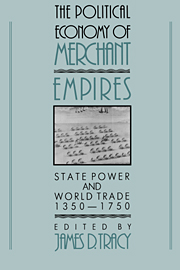Book contents
- Frontmatter
- Contents
- Acknowledgments
- Introduction
- 1 Institutions, Transaction Costs, and the Rise of Merchant Empires
- 2 Merchants and States
- 3 The Rise of Merchant Empires, 1400–1700: A European Counterpoint
- 4 Europe and the Wider World, 1500–1700: The Military Balance
- 5 The Pirate and the Emperor: Power and the Law on the Seas, 1450–1850
- 6 Transport Costs and Long-Range Trade, 1300–1800: Was There a European “Transport Revolution” in the Early Modern Era?
- 7 Transaction Costs: A Note on Merchant Credit and the Organization of Private Trade
- 8 Evolution of Empire: The Portuguese in the Indian Ocean During the Sixteenth Century
- 9 Comparing the Tokagawa Shogunate with Hapsburg Spain: Two Silver-Based Empires in a Global Setting
- 10 Colonies as Mercantile Investments: The Luso-Brazilian Empire, 1500–1808
- 11 Reflections on the Organizing Principle of Premodern Trade
- Selected Bibliography of Secondary Works
- Index
8 - Evolution of Empire: The Portuguese in the Indian Ocean During the Sixteenth Century
Published online by Cambridge University Press: 25 March 2010
- Frontmatter
- Contents
- Acknowledgments
- Introduction
- 1 Institutions, Transaction Costs, and the Rise of Merchant Empires
- 2 Merchants and States
- 3 The Rise of Merchant Empires, 1400–1700: A European Counterpoint
- 4 Europe and the Wider World, 1500–1700: The Military Balance
- 5 The Pirate and the Emperor: Power and the Law on the Seas, 1450–1850
- 6 Transport Costs and Long-Range Trade, 1300–1800: Was There a European “Transport Revolution” in the Early Modern Era?
- 7 Transaction Costs: A Note on Merchant Credit and the Organization of Private Trade
- 8 Evolution of Empire: The Portuguese in the Indian Ocean During the Sixteenth Century
- 9 Comparing the Tokagawa Shogunate with Hapsburg Spain: Two Silver-Based Empires in a Global Setting
- 10 Colonies as Mercantile Investments: The Luso-Brazilian Empire, 1500–1808
- 11 Reflections on the Organizing Principle of Premodern Trade
- Selected Bibliography of Secondary Works
- Index
Summary
INTRODUCTION
A better understanding than obtains at present of the nature of the Portuguese imperial enterprise in the sixteenth-century Indian Ocean depends on the resolution of a paradox: If it is poorly understood, this is because the principal “facts” of the matter are apparently so well known. Every schoolboy knows – or is supposed to know – of Vasco da Gama's voyage of 1497–9, and of Afonso de Albuquerque's acts of empire-building. Thereafter, at least in popular imagination, the Portuguese Empire in Asia disappears into historical mists, until it reemerges in the early seventeenth century as the rival of the East India companies.
Historians, too, seem to have been seduced into thinking along these lines. The best known recent characterization of the sixteenth-century Portuguese Asian Empire is self-confessedly “structural” in its construction, and the purpose of its author Niels Steensgaard is to use this characterization as part of an exercise in Institutional Darwinism, wherein the organizational superiority of the East India companies may be inferred from the very fact of their “triumph.” To this end, the essence of the Portuguese presence is extracted from a sample of documentation drawn indifferently from various parts of the sixteenth century; the chief elements that emerge are, at the Asian end, “constitutionally determined corruption” and a “redistributive enterprise,” while at the European end we are informed that the Portuguese ran what was in sum a “customs-house operation.”
- Type
- Chapter
- Information
- The Political Economy of Merchant EmpiresState Power and World Trade, 1350–1750, pp. 298 - 331Publisher: Cambridge University PressPrint publication year: 1991
- 9
- Cited by



